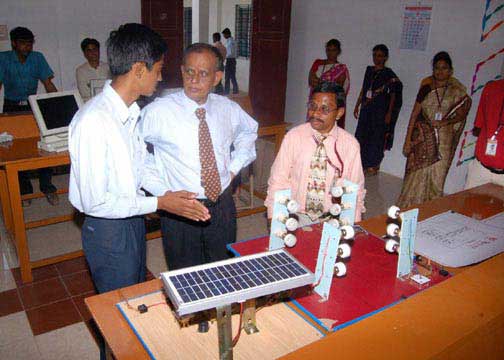About the Workshop
Human activities have led to large increases in heat-trapping gases over the past century. Global average temperature and sea level has increased and precipitation patterns have changed. The global warming trend in the past 50 years is due primarily to human-induced increases in heat-trapping gases. Human "fingerprints" also have been identified in many other aspects of the climate system, including changes in ocean heat content, precipitation, atmospheric moisture, and Arctic sea ice. Global temperatures are projected to continue to rise over this century; by how much and for how long depends on a number of factors, including the amount of heat-trapping gas emissions and how sensitive the climate is to those emissions.
This workshop proposes to deal with global warming, resultant climate change and green supply chain management
What remedies can be made to lessen the adverse impact of global warming on quality of human life
Workshop Outline
Green supply chain management, sustainable supply chain, environmentally friendly products, improve environmental performance, climate system, challenges and remedies for climate change, halo carbons, carbon credit, ocean heat.
Resource Persons
Professor S.C. Lenny Koh
Associate Dean, Head of Management
Chair Person in Operations Management
The University of Sheffield, UK
Dr.R.Rajaram
Professor & Dean
Department of Computer Science & Engineering
Vickram College of Engineering
Participants
The Workshop is addressed to Faculty of Engineering Colleges, Research Scholars, PG and UG Students of all the Engineering Colleges. The completed applications should reach the coordinator on or before 8th April 2012.
Registration Fee
The registration fee includes
- Certificate of participation
- Lunch and refreshment for two days.
Faculty : Rs. 500/-
Research scholar : Rs. 400/-
Student : Rs. 300/-
Mode of Payment
All payments should be made by a crossed Demand Draft in favour of “The Principal, Vickram College of Engineering” payable at Madurai.
Please send duly filled in registration form by post along with D.D to
The Head of the Department,
Department of Mechanical Engineering,
Vickram College of Engineering,
Enathi, Tamilnadu - 630 561.
Accommodation: Boarding and Lodging will be provided in the college hostel on chargeable basis.
Contact:
Mr.R.Kamalakannan, This email address is being protected from spambots. You need JavaScript enabled to view it., +91 98944 24470
Mr.N.Shunmugasundaram, This email address is being protected from spambots. You need JavaScript enabled to view it., +91 99422 87210
A synergistic session on "Global Warming and Carbon Credit" was conducted on 15 March 2012 Thursday at I yr. Block.
Dr. Prakasham Tata, Prof. University of Illinois, USA, addressed the gathering. Dr. Tata was born in Vizianagaram, Andhra Pradesh, India. Prior to coming to the US for higher studies in 1962, he worked in rural areas of West Bengal and Maharashtra for seven years on sanitation and water supply problems. Dr. Tata received his honorary Ph.D. in 1966 from Rutgers University, New Jersey.
The crux of his lecture is given below—
Global warming is an increase in the earth's average temperature: a rise in it could in turn root to other alterations in the ecology; including an increasing sea level, modifying the quantity and pattern of rainfall. These modifications may end up in severe climate events—such as floods, famines, heat waves, tornadoes, twisters, etc. Due to global warming, species like golden toad, harlequin frog of Costa Rica has already become extinct and many are in endangered lists too. Also, various new diseases have emerged lately: viruses like ebola, hanta and machupo survive better in elevated temperatures and even multiplies faster. The marine life is no exceptional. In a recent survey made in the marine life, sea creatures reacted significantly to the changes in water temperatures. The global warming is expected to cause irreversible changes in the ecosystem and the behavior of animals.
Dr. Tata emphasized on money-making through carbon sequestration and management of nutrients in waste water. His lecture touched upon the clean development mechanism (CDM), and waste water treatment processes (WWTP). The CDM allows emission-reduction projects in developing countries to earn certified emission reduction (CER) credits, each equivalent to one tonne of CO2. The mechanism stimulates sustainable development and emission reductions, while giving industrialized countries some flexibility in how they meet their emission reduction limitation targets. Dr. Tata's tormenting concerns were to supply potable water for the community, provide sanitation which does not exist, eliminate endemic water-borne diseases, and creates an aesthetic environment and conserve water. He also stressed on carbon footprint: a term that has cropped up these days. While talking about climate change, footprint is a metaphor for the total impact that something has. A carbon is shortened for all the different green house gases that contribute to global warming. The term carbon footprint, is thus a shorthand to describe the best estimate that we can get of the full climate change impact of something. That something could be anything: an activity, an item, a lifestyle, a company, a country, or even the whole world.
"We have been treating our atmosphere like we once did our rivers", lamented Tata. We dump waste thoughtlessly into our atmosphere, believing that they were infinite in their capacity to hold anything. Our atmospheres has limits too. CO2 remains in the atmosphere for about 100 years. The longer we keep polluting, the longer it will take to recover; and the more irreversible damage will be done.
On responding to the questions raised by the students, one of the most prominent answers given towards global warming was: planting more saplings to decrease the global warming. This could also be followed by minimal usage plastic products, and green house gases like CO2, SO2, SO3, CFC, Freon etc. Apart from global warming, students actively questioned on US economy, carbon trading etc.
As a subsequence to this session, few saplings were planted at the college yard in the presence of the Director, the Principal, the A.O., the Dean, the staff members of various departments, and the students.

